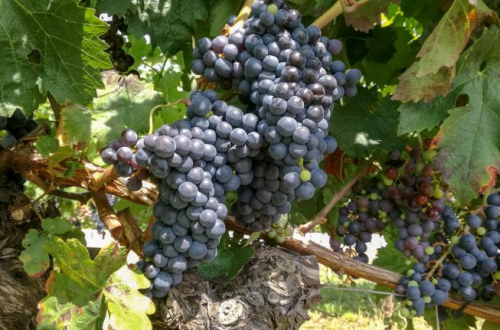
Apassionato di Asprinio Presso L’Agricola Vinicola Cavasete
The word for today is Asprinio. In Italian, asprinio, refers to something tart or sour. In this case, we are referring to the so-called Italian grape in the south of Italy. I have not had much experience with Asprinio, as it is not widely available in the US…(yet). Nevertheless, I had the pleasure of becoming more acquainted with this grape, and several others, rooted in Southern Italy, while serving as a wine judge for Radici del Sud in Puglia. Radici del Sud, or Roots of the South, has been operating since 2005 to make the food, wine and viticulture in southern Italy more visible in the regions of Puglia, Basilicata, Campania, Calabria, Sicily, Molise, Sardinia and Abruzzo.

This prestigious event did just what it intended: to highlight and celebrate the indigenous grapes and producers in Southern Italy. There is so much to discover! Asprinio and Agricola Cavasete are great examples.
L’Azienda Agricola Vinicola Cavasete
Azienda Agricola Vinicola Cavasete is located in the province of Caserta. The winery produces wines in the Aversa DOC (Created in 1993), which is also referred to as the Asprinio di Aversa DOC. The appellation surrounds the town of Aversa and extends from the southern portion of Caserta to north of Naples. Here, the wines are based on the local grape, Asprinio. Due to the fact that the wines in this region, such as Asprinio, were historically consumed mostly by locals, some of them almost disappeared from commercial production. This is where Agricola Vinicola Cavasete came in to save the day…and the wine!
Giuseppe Luongo, owner and oenologist of the winery, has continued his grandfather’s tradition with the cultivation and production of Asprinio di Aversa. The goal is to continue preservation and to enhance appreciation of this historic wine. Asprinio is cultivated vertically, using the Etruscan Alberata Aversana method, which connects (or marries) the vine to a poplar tree for support. This heroic, Etruscan practice is most conducive, as it allows the grape vines to grow as tall as 15 meters, while receiving optimal sunlight and sea breezes.




Since 2021 the company has produced organic grapes, and intends to be certified organic by 2023. Azienda Agricola Vinicola Cavasete has a total of 1.2 hectares and the total production is approximately 4,500 bottles in total.

Asprinio
As stated, Asprinio, which is the Italian word for tart, is the white wine grape known for its sharp and acidic character. Asprinio is grown in fertile soils, with a sub-soil of tufo, or soft, porous volcanic rock. Naturally, then, the wines have a certain salinity or mineral quality. According to DNA, Asprinio is genetically identical to Greco di Vesuvio. Yet there are very different characteristics between the two. Asprinio is marked by high acidity, which makes it ideal for aging. Moreover, Asprinio’s high natural acidity is ideal for the production of sparkling wines, although it is made both ways. Asprinio may be a lesser known grape, but it is certainly not a new discovery. In fact, Asprinio and other indigenous grapes to Campania have been appreciated by Popes, Kings and nobles since the Middle Ages. For example, here’s what has been said about this wine:
“Un joli petit vin” (A nice little wine)
-Alexander Dumas, French Author
“Allegro, leggero, brioso” (Cheerful, light, lively)
-Luigi Veronelli, Italian Wine Critic
“Che grande piccolo vino!” (Such a great little wine!)
-Mario Soldati, Author, Film Director, Wine Connoisseur

(Alberata Aversana)
The Wining Hour Tasting of Cavasete Wines
Initially, I met the producer, Guiseppe, and tasted his wines during the walk-around wine-tasting exhibition at Castello Normanno Svevo di Bari, Puglia. However, I was able to broaden my knowledge during a follow-up trip to Napoli. I spent some time with Guiseppe to learn more about his wines and winery. Asprinio is not an easy grape, but Giuseppe stands by the fact that “passion exceeds all expectations.” We explored some sights in Campania and he generously presented me with some wines for a more in–depth tasting. Here’s what I experienced:

Cavasete, Pasion, Asprinio di Aversa Spumante Brut DOC
According to the regulations, Asprinio di Aversa Spumante must be 100% Asprinio. Pasion Brut is the flagship of Cavasete. This spumante brut is a pale straw yellow color and quite aromatic with a nose of lemon and cedar. The palate was lively, with more citrus notes, along with almond and spice. Pasion’s distinctive acidity and minerality clearly reflect the nature of the grape and its terroir. The effervescence is on par with spumante, foaming and fizzy. Pasion Brut is made via metodo martinotti and has 12% ABV. This spumante is produced from hundred-year-old vines that only allow a small number of bottles to be produced. Very special indeed!

Cavasete Formione Asprinio di Aversa DOC 2021 is a still Asprinio. The Asprinio di Aversa DOC calls for a minimum of 85% Asprinio. The name, Formione, refers to the ancient Greek soldier who is considered to be the first great admiral in history. A historical wine grape, deserves a historical name. Formione Asprinio is a lovely straw yellow wine with notes of citrus fruit (lemon) on the nose and palate. Young, fresh and pleasant. This light-bodied wine with racy, lemony acidity would be great alone as an aperitivo or paired with fried fish or calamari. 12% ABV.
Cavasete Hera Nova Asprinio Alberata 2021 is an another still Asprinio, whose name recalls the goddess of marriage and marital fidelity. Hera Nova is produced from grapes with the Etruscan Alberata method, which also refers to a marriage (between the grapevine and the tree). Aged only in stainless steel allows for the preservation of the typical aromas of citrus and green apple, and brings out the fresh imprint on the palate. This wine definitely expresses the territory, with hints of minerals and chamomile. Very drinkable with 11% ABV.
Cavasete Plutarco Malvasia Bianca 2021 is produced with 100% Malvasia Bianco di Candia. Plutarco refers to the prolific Greek writer who penned his famous work, “Parallel Lives.” Intense aromas and flavors of honey, apricot and musk. What a treat! Plutarco is versatile and would pair, parallel, or go alongside almost everything, from most seafood dishes and chicken to pastries and cakes. 11% ABV.
Cavasete Galeno Aglianico Campania IGP 2021 is produced with another indigenous grape to the Campania region-Agianico. In fact, Aglianico is the king of Campanian red grapes. Galeno is ruby red with aromas of cherry, wild berries and mineral nuances. Violet, blackberry and red fruits are on the palate. Full bodied and full of tannins and acidity. 14% ABV.
I had a delightful time in Napoli learning about Giuseppe’s production of Asprinio. His work with this ancient Campanian grape is definitely noble and Asprinio is a grape everyone should know. A special thanks to him for sharing it and to Radici del Sud for continuing to promote the indigenous grapes of Italia Sud.







